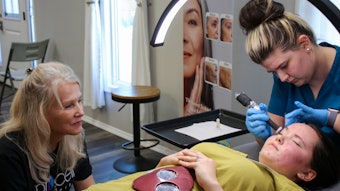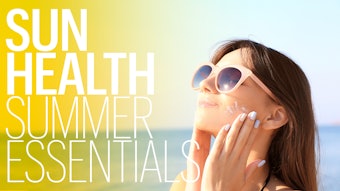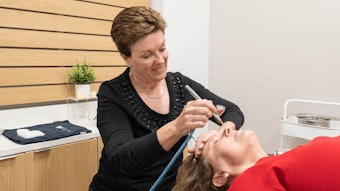After you have asked yourself several questions about what kind of job is the best fit for you, you can begin focusing in applying to specific business types. Perhaps you have been to a spa or medical office that offers the kinds of services you would like to provide, and they carry a brand of professional skin care products that you support. Treat yourself to a service at that location. This will allow you to get an idea about treatment protocols, as well as the friendliness of the team and the sanitary conditions of the facility. It provides a reason to introduce yourself, and make a favorable impression—even if it’s just as a client. If that business has an open house for clients, be sure to attend in order to make connections with staff and any vendors in attendance. This demonstrates your enthusiasm and support in a more relaxed setting.
Résumé
If you are still an esthetic student, you should have your résumé pulled together at least one month before you graduate. You will need to make small adjustments to it every time you apply at a different location in order to focus on that specific business. For example, if you are applying at a medical spa, make sure any medical experience you may have is included in a very visible way in your résumé. Always carry a résumé, even when you’re in school because you never know when you will find the right match. Let it be known why you are worth the wait, and do not hesitate to offer your résumé even if there are no positions currently available.
Research
Once you have decided on a few places to pursue, do your research. Check out each facility’s Web site and find out everything you can about, such as hours of operation, staff bios, products retailed, equipment used, services offered and mission statement. Also note the products the spas carry or the equipment used to find out more about them.
Education
No matter what your current level of education or experience, it is crucial to always continue learning by taking part in advanced education opportunities. Research classes or seminars covering products, techniques or updated protocols that you can attend. Make a list of information you would like to learn, and commit to taking at least one class a year. Industry trade shows are great because you often can attend several different types of educational classes during one event.
Are you intimidated because you just got out of school and are looking for your first job? Be sure to focus on the qualifications you do have and not on the ones you don’t. Also acknowledge to potential employers that you are looking forward to doing things their way, so they can be reassured that they won’t have to worry about you saying “Well at the last place I worked, we did it this way.” There is a positive side to every phase of your career.
Work ethic
Your work ethic and professional commitment are key. If you get the job, but are often late, unmotivated or bring personal concerns to the workplace, you could build a bad reputation. Getting along with others is a huge benefit with any business. Your skills and education could be outstanding, but no business can afford a team member that is regularly starting or involved in conflict in the workplace with co-workers or clients.
Interview
After you have been granted an interview, use some of the information you gathered while researching the spa’s Web site; mention something you saw on its site that impressed you. Prospective employers love to know you are interested in their business, and this will lead to an open conversation, rather than just a question and answer session. If the interview ends with, “We’ll call you,” offer to make yourself available for a second interview or a service demonstration.
Clarify
Many people start a job with many questions unanswered. Here are some details you will want to be informed about before the final agreement takes place.
- Will I have a regular schedule or will it vary? Please provide an example of an average schedule.
- What duties am I expected to perform when I am not providing services? (Laundry? Answering phones? Inventory or product ordering? Filing?)
- What is the pay structure? (Hourly? Percentage of service? Does that percentage change if I am requested by the client? Station lease?)
- Are medical benefits and liability insurance provided?
- Is commission paid and are there other incentives for product sales?
- What additional benefits are provided? (Advanced education stipend? Discount on services or products?)
- Am I solely responsible for promoting my services? Does the employer promote my services on its Web site, in advertisements and on-site?
You will feel more confident knowing both you and your potential employers are on the same page.
Thank you
As silly as this may sound, be sure to thank people. Thank your prospective employer for the interview and be sure to mail a handwritten follow-up thank you note, too. Thank the person who originally accepted your résumé. Thank people for their time. Thank clients for coming in to see you. And don’t forget to thank yourself for taking the time, doing the research and being persistent in order to achieve your goals.










